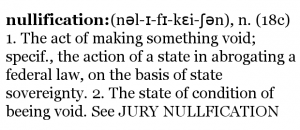(ThyBlackMan.com) “It’s amazing I’m in this maze with you/I just can’t crack your code/One day you’re screaming you love me loud/The next day you’re so cold/One day you’re here, one day you’re there, one day you care/You’re so unfair/sipping from your cup/‘Til it runneth over/Holy Grail.” So goes the hook of the 2013 hit single ‘Holy Grail’ from Jay Z and Justin Timberlake. Contextually, the song is an ode to their love/hate relationship with fame and fortune.
As I heard the song recently while taking a long drive, it dawned on me that the lyrics of that hook could easily be applied to some conservative leaders’ poisonous dream of nullification and secession. Is it possible these two things fuel the search for their unholy grail?
In a 1967 interview with the Los Angeles Times, actor-writer-producer Rod Serling offered this quote: “I happen to think that the singular evil of our time is prejudice. It is from this evil that all other evils grow and multiply. In almost everything I’ve written there is a thread of this: a man’s seemingly palpable need to dislike someone other than himself.” These words are both true and disappointing. How are we to describe politicians in certain states who are so intolerant, they willfully refuse to comply with federal laws?
These words are both true and disappointing. How are we to describe politicians in certain states who are so intolerant, they willfully refuse to comply with federal laws?
How are we to respect so-called leaders who are so dishonest and disingenuous, they would rather their state leave the U.S. instead of acknowledge President Obama as the twice-elected leader of the free world? Excluding race, why is this the case? Nullification is the precursor to secession. A holy grail is supposed to be holy. Nullification and secession are fueled by ignorance, hatred, and hidden agendas by one group of Americans against all other Americans. Unlawful actions cannot produce righteous results.
According to FreeDictionary.com, nullification is defined as the “refusal or failure of a U.S. state to recognize or enforce a federal law within its boundaries.” It happens virtually every day. In 2013, 11 states introduced nullification laws formally announcing their intentions to ignore federal legislation and/or implementation on laws ranging from gun violence legislation (North Carolina) to the Affordable Care Act (South Carolina) to immigration reform (Arizona).
Have you heard of SJR-45? Proposed by Tea Partier Brian Nieves – a Missouri Conservative state senator – this 2012 proposal was a textbook example of “you’re not the boss of me” state politics. Last fall in Virginia, Ron Paul extolled the virtues of nullification at an 11th hour political rally to support Ken Cuccnelli. Mr. Cuccnelli lost. Unholy grail.
This Congress isn’t passing anything. I just can’t crack its code.
Secession is defined as “the withdrawal of states from the Union.” Secession has happened once before. That huge schism known as the Civil War was precipitated in 1860-1861 when all eleven Southern states seceded from the United States in order to preserve their right to continue engaging in slavery. South Carolina, Mississippi, Florida, Alabama, Georgia, Louisiana, Texas, Virginia, Arkansas, North Carolina, and Tennessee promptly formed the Confederate States of America. Don’t be fooled by conservative efforts now to revise historical events which occurred then. Secession threats have surged in America since President Obama took office in 2009. They’re happening right now. With Governor Rick Perry at the helm, Texas has been threatening secession on and off since 2009.
Last fall, residents of 11 counties in Northern Colorado voted whether or not to secede from the U.S. – while simultaneously working to become the 51st state. The referendum failed, naturally; but what if it had passed? Would Northern Colorado have been its own state – or its own country? The legislators at the statehouse in Denver would never have allowed Colorado to actually secede under any circumstances. This axiom holds forth in every single state. Here’s looking at you, Wisconsin. You’re so cold.
One cannot imagine the sheer madness an American state would face if it somehow managed to leave the union. It would need a new system of government, its own currency, infrastructure, military, healthcare, educational system, law enforcement, diplomats, and tax codes – for starters. These are all incredibly elaborate and insanely expensive.
What’s greater: the love of God and country – or the vituperation for a President and his legislative agenda? Your answer will quickly reveal whether or not you’re an unholy grailer.
Ignoring federal laws whenever the mood hits you isn’t brilliant; it’s nonsensical. Publicly advocating for any state to remove itself from the sovereignty of the United States doesn’t make you visionary; it makes you shortsighted. Officeholders who do and say such things aren’t lions – they are linos: leaders in name only. These misguided folks and those who blindly follow them in their quest for a mythical, unholy grail are in for a rude awakening. Inside that grail, they won’t find enlightenment. They’ll only find fool’s gold.
Staff Writer; Arthur L. Jones, III
This talented brother is a local Minister, weekly featured Democratic Op-Ed columnist, non-profit advisor, and sees the Braves winning it all this fall. Rev. Jones welcomes your comments! Please email him directly at: tcdppress@gmail.com.

















Good evening. I read your article and would suggest that you read “the rescue of Joshua Glover: a fugitive slave…” ISBN 978-0821418130.
One thing seems to be missing from your article. Fugitive Slave Acts made it a federal crime to help slaves even in the north, as well as making it a crime to refuse to assist federal officers (or southern slave owners) who were attempting to arrest a fugitive slave. The point of your article is that refusing to follow federal laws is unacceptable. How would you have suggested that the men of Wisconsin act when Joshua Glover, a fugitive slave, was captured by his “slave master”? If your article was published in 1850, you would have been siding with the “slave master”. I know it isn’t 1850 anymore, but people of the various states must have a way to protect human liberty in the face of federal overreach. Nullification is a much more mild method than secession. Secession talk usually occurs when individuals believe the federal government is “out of control”. A much less extreme method of dealing with perceived federal overreach would be simply nullifying federal law. For example, look at the Real ID law. It is a federal law but has not been enforced because a few states effectively nullified it within their boundaries. There was no talk of secession in those states, because they understood the much less extreme action of nullification.
I guess I am surprised that your article completely missed this important history of nullification, especially since it deals directly with race and federal laws.
Respectfully,
John